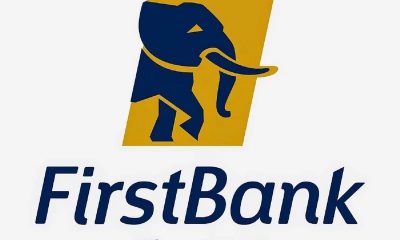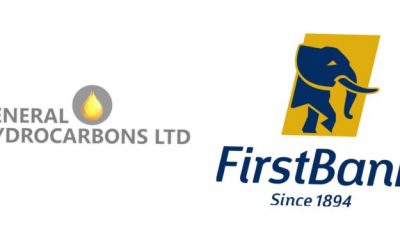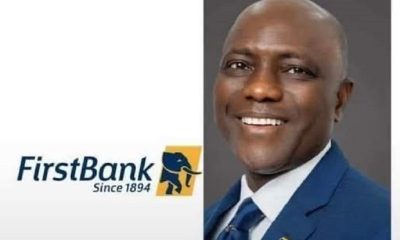Banking
Businessman Loses Billions of Naira, Properties to First Bank
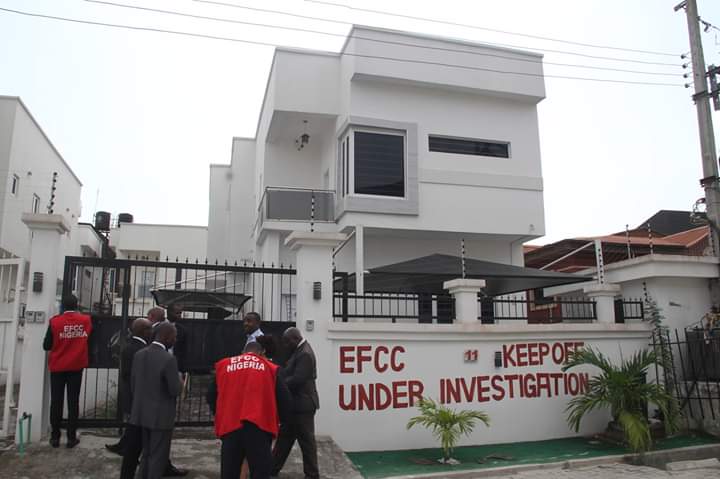
By Dipo Olowookere
Properties worth millions of Naira and money worth billions of Naira have been lost to First Bank by a businessman and owner of SmartMicro, Mr Michael Obasuyi Osasogie.
The items, which include a total of 116 cars and 20 landed properties scattered in Edo, Rivers and Lagos States, were seized by the Economic and Financial Crimes Commission (EFCC) and handed over to the financial institution on Wednesday, November 28, 2018.
Trouble began for Mr Osasogie after a petition he wrote to the anti-corruption agency against E-tranzact in March 2018.
The commission had, however, investigated Mr Osasogie’s business interests, following receipt of a counter-petition written by e-tranzact against him and one of his companies, SmartMicro.
SmartMicro was said to have approached e-tranzact in 2012 for the deployment of bulk purchase solution called “Corporatepay” to facilitate payment of salaries of Delta State employees in microfinance banks.
It was also alleged that e-tranzact configured an additional outbound fund transfer solution called “Fundgate” in 2017, which required SmartMicro to maintain a pre-funded settlement account with First Bank Plc for settlement of account it had initiated.
However, e-tranzact had further alleged that the bank, sometime in March 2018, revealed that the settlement account was in debit of N11,498,944,038.29.
Mr Osasogie, in his statement to the EFCC, confessed to have committed the crime, stating that he created fraudulent and imaginary monies through the aid of Fundgate Financial Application from the company.
Consequently, Mr Osasogie was arraigned alongside his firms-Platinum Multi-Purpose Co-operative Society, SmartMicro Systems Limited and Platinum Smart Cruise Motors Limited on May 24, 2018 before Justice Justice Mojisola Dada of the Special Offences Court sitting in Ikeja on a 14-count charge bordering on stealing to the tune of N11.5 billion.
One of the counts reads: “That you, Michael Obasuyi Osasogie, Platinum Multi-Purpose Co-operative Society, SmartMicro Systems Limited and Platinum Smart Cruise Motors Limited, sometime in the year 2016 in Lagos within the jurisdiction of this Honourable Court, conspired to commit felony, to wit: stealing of the sum of N11,498, 944, 038.29 property of First Bank Nigeria Ltd.”
He pleaded guilty to the charge preferred against.
During his trial, an investigator with the EFCC, Orji Chukwuma, had told the court how the proceeds of crime were housed in some new generation banks.
Led in evidence by the prosecution counsel, Rotimi Oyedepo, Chukwuma had told the court that “SmartMicro Systems Limited assumed a position of a fictitious microfinance bank in Nigeria through a software, Micro switch Server 1.1 created by the defendant as well as two genuine microfinance banks, which he used to carry out his fraud.
“The defendant later opened an account with First Bank Plc and subsequently raised an overdraft from his fictitious microfinance bank for his account in the bank, which it ignorantly paid.”
In his further testimony, the witness had told the court that when e-tranzact disconnected from the chain, all the transactions carried out by the defendant collapsed on his own account with First Bank, thereby leading to the discovery of the fraud.
The sums of N2,903,727,563.92, $37,992.87 and €18,538.09 were recovered by the commission from Mr Osasogie’s accounts in various banks in the country.
The agency also recovered 116 cars and 20 properties located in Lagos, Abuja, Benin and Port Harcourt.
The prosecution counsel had, therefore, urged the court to convict the defendant on counts one to 14, according to the law.
The defendant later entered into plea bargain. The prosecution counsel therefore urged the court to consider the plea bargain entered into by the defendant on May 21, 2018 as judgment in his sentencing.
Counsel to the first and second defendant, Osasu Ogebor, had told the court that his clients went into a plea bargain in order to give out what does not belong to him.
“It is not enough for the accused person to say I am sorry for what he has done. But from his inner heart, he is absolutely sorry, my Lord”, Ogebor had pleaded.
Counsels to the third and fourth defendants also aligned themselves with Ogebor’s prayers.
Delivering her judgment, Justice Dada convicted the defendant on all the counts and sentenced him to one-year imprisonment.
The Judge also ordered the forfeiture of defendant’s 116 buses, 20 properties and monies in various accounts to First Bank Plc.
At the hand- over ceremony, which held in one of the forfeited houses at Osapa London, Lekki-Lagos, Kaina Garba, Head Asset Forfeiture and Recovery Management Unit of the EFCC, Lagos office, handed over the documents and keys to the properties to Gabriel Edobor, Head, Remedial and Classified Assets Management Department, First Bank Plc and Eme Godwin, Group Head, Legal Unit, E-transact.
In a show of appreciation, both Edobor and Godwin thanked the EFCC for ensuring the recovery of the properties through diligent and uncompromising investigative efforts.
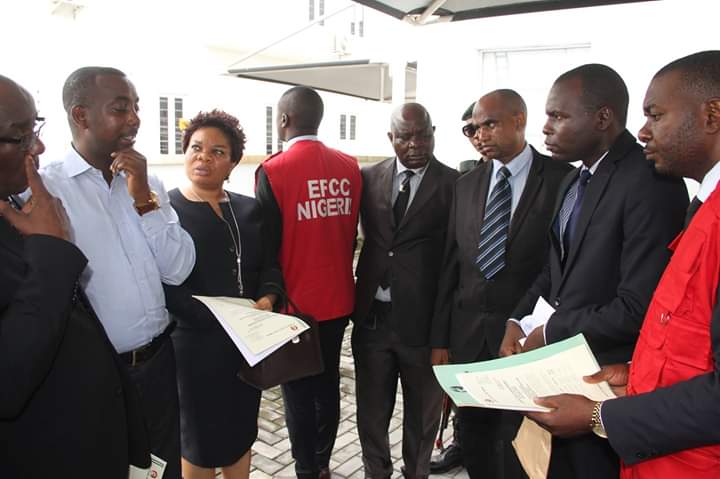
Banking
CIBN to Back ACAMB on Professional Development, Industry Advocacy

By Modupe Gbadeyanka
The Chartered Institute of Bankers of Nigeria (CIBN) has promised to support the ambitious plans of the Association of Corporate and Marketing Professionals in Banks (ACAMB).
At a meeting between the leaderships of the two organisations on Tuesday, the president of CIBN, Professor Pius Deji Olanrewaju, said it was impressed with the capability development and the undergraduate mentorship schemes of ACAMB under its leader, Mr Jide Sipe.
The CIBN chief commended the forward-thinking vision of the group, saying it had raised standards across Nigeria’s banking sector.
“ACAMB’s support has given CIBN and the banking sector brand equity,” he said, praising the association’s record in reputation management. recalling ACAMB’s role in addressing crises within the sector, describing the partnership as strategic and beneficial.
He further pledged support for ACAMB’s 30th anniversary in September 2026, its AGM, and other programmes, including fundraising initiatives.
“I want to assure you that everything you have presented today has been clearly noted and will be acted upon.
“We are fully committed to working closely with you so as to translate these discussions and vision into measurable progress. Our shared goal is to strengthen the sector, protect its reputation, and enhance its public image in a meaningful and lasting way.
“This meeting discussed various initiatives and reforms crucial for the future of our industry, including the need for continuous training and adaptation to new programs,” Mr Olanrewaju stated.
Speaking at the meeting, the president of ACAMB described the visit as a crucial first step in his tenure, aimed at contributing significantly to giving flight to his vision and that of ACAMB.
“When we assumed office, one of the first things we agreed on was the need to visit key stakeholders.
“However, before reaching out more broadly, we felt it was important to begin with our primary constituency and core stakeholders. We want them to understand the direction we are taking and to support the work we are doing, so that ACAMB can achieve greater success than it has in the past.
“We couldn’t have properly started our tenure without this very important meeting with the CIBN,” Mr Sipe stated
He introduced the newly constituted ACAMB Exco, which includes the 2nd Vice President, Morolake Phillip-Ladipo; General Secretary, Olugbenga Owootomo; Assistant General Secretary, Ademola Adeshola; Publicity Secretary, Abiodun Coker; and Executive Secretary, Fadekemi Ajakaiye.
Banking
All Set for Second HerFidelity Apprenticeship Programme

By Modupe Gbadeyanka
Registration for the second HerFidelity Apprenticeship Programme (HAP 2.0) organised by Fidelity Bank Plc has commenced.
The Divisional Head of Product Development at Fidelity Bank, Mr Osita Ede, informed newsmen that the initiative was designed to empower women with sustainable entrepreneurship skills.
The lender created the flagship women-empowerment initiative to equip women with practical, income‑generating skills and structured pathways to entrepreneurship.
“HerFidelity Apprenticeship Programme 2.0 reflects our commitment to continuous improvement. Having evaluated feedback from the first edition, we have returned with stronger partnerships and deeper mentorship programmes to ensure that women acquire not just skills, but sustainable economic opportunities,” he said.
“At the heart of the programme is guided, real‑world learning. Participants will undergo intensive apprenticeship training under reputable institutions and industry experts across select fields such as hair styling, shoe making, auto mechatronics, and interior decoration,” Mr Ede added.
He noted that HerFidelity Apprenticeship Programme 2.0 goes beyond skills acquisition by offering participants a wide range of business advisory services. These include business and financial literacy training, mentorship support throughout the apprenticeship journey, access to Fidelity Bank’s women‑focused and SME financial solutions, as well as guidance on business formalisation and growth strategies.
Further emphasising the bank’s vision, Mr Ede said, “By integrating structured mentorship with entrepreneurial development, Fidelity Bank is positioning women not just as trainees, but as future employers, innovators, and economic contributors within their communities. This aligns with our mandate to help individuals grow, businesses thrive, and economies prosper.”
Banking
The Alternative Bank Opens New Branch in Ondo

By Modupe Gbadeyanka
A new branch of The Alternative Bank (AltBank) has been opened in Ondo State as part of the expansion drive of the financial institution.
A statement from the company disclosed that the new branch would support export-oriented agribusinesses through Letters of Credit and commodity-backed trade finance, ensuring that local producers can scale beyond state borders.
For SMEs, the bank is introducing robust payment rails, asset financing for equipment and inventory, and supply chain-backed facilities that strengthen working capital without trapping businesses in interest-based debt cycles.
The Governor of Ondo State, Mr Lucky Aiyedatiwa, represented by his Chief of
Staff, Mr Olusegun Omojuwa, at the commissioning of the branch, underscored the importance of financial institutions in economic development.
“The pivotal role of financial institutions to economic growth and development of any economy cannot be overemphasised. It provides access to capital, supporting small and medium-scale enterprises and encouraging savings.
“Therefore, I have no doubt in my mind that the presence of The Alternative Bank in Ondo State will deepen financial services, create employment opportunities and stimulate economic activities across various sectors,” he said.
In her remarks, the Executive Director for Commercial and Institutional Banking (Lagos and South West) at The Alternative Bank, Mrs Korede Demola-Adeniyi, commended the state government’s leadership and outlined the lender’s long-term vision for Ondo State.
“As Ondo State steps into its next fifty years, and into the future anchored on the sustainable development championed during the recent anniversary celebrations, The Alternative Bank is here to be the financial engine for that vision. We didn’t come to Akure to hang banners. We came to fund work, farms, shops, and factories.”
With Ondo State’s economy anchored largely on agriculture, particularly cocoa production, poultry farming, and other cash crops, alongside a growing SME and trade ecosystem, AltBank is deploying sector-specific financing solutions tailored to these strengths.
For cocoa aggregators, processors and poultry operators, the bank will provide production financing, facility expansion support, machinery lease structures, and structured trade facilities under its joint venture and cost-plus financing models, with transaction cycles of up to 180 days for commodity trades and longer-term structured asset financing for equipment and infrastructure.
The organisation is a notable national non-interest bank with a physical network now surpassing 170 locations, deploying capital to solve real-world challenges through initiatives such as the Mata Zalla project, which saw to the training of hundreds of women as electric tricycle drivers and mechanics.
-

 Feature/OPED6 years ago
Feature/OPED6 years agoDavos was Different this year
-
Travel/Tourism10 years ago
Lagos Seals Western Lodge Hotel In Ikorodu
-

 Showbiz3 years ago
Showbiz3 years agoEstranged Lover Releases Videos of Empress Njamah Bathing
-

 Banking8 years ago
Banking8 years agoSort Codes of GTBank Branches in Nigeria
-

 Economy3 years ago
Economy3 years agoSubsidy Removal: CNG at N130 Per Litre Cheaper Than Petrol—IPMAN
-

 Banking3 years ago
Banking3 years agoSort Codes of UBA Branches in Nigeria
-

 Banking3 years ago
Banking3 years agoFirst Bank Announces Planned Downtime
-

 Sports3 years ago
Sports3 years agoHighest Paid Nigerian Footballer – How Much Do Nigerian Footballers Earn




